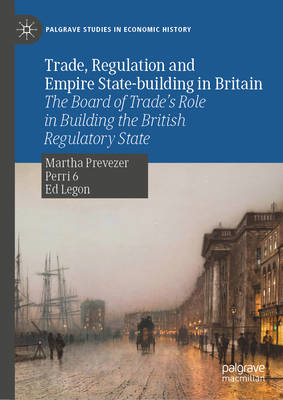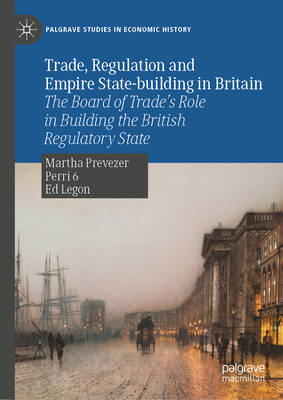
- Retrait gratuit dans votre magasin Club
- 7.000.000 titres dans notre catalogue
- Payer en toute sécurité
- Toujours un magasin près de chez vous
- Retrait gratuit dans votre magasin Club
- 7.000.0000 titres dans notre catalogue
- Payer en toute sécurité
- Toujours un magasin près de chez vous
Trade, Regulation and Empire State-Building in Britain
The Board of Trade's Role in Building the British Regulatory State
Martha Prevezer, Perri 6, Ed Legon
183,45 €
+ 366 points
Description
This book explores the impact of the Board of Trade upon the British state from the early seventeenth century to the early twentieth century. The study argues that for too long historians have overlooked the Board, yet it was a critical force in shaping the British state and in developing its capacity both for economic regulation and for economic development. Focusing on the slave trade and on the textiles, shipping, and infrastructural industries, the authors examine the Board of Trade's role in shaping, promoting, and protecting these industries and thereby in defining the British state's economic interests. The book adds the notion of an imperial-corporate state to widely used concepts of fiscal-military and mercantilist state-building. Challenging the adequacy of the many theories which emphasise taxation and currency in state-building, this study stresses the importance of micro-economic interventions. It unpacks the distinctive character of the British state's system of micro-economic governance by tracing one central department's evolution and its relations with other departments, British businesses and infrastructure, and with the governance structures operating between state, company-states, colonies, and domestic business. Three sub-periods of the Board of Trade's history are distinguished, each marked by a distinctive relationship with the domestic and imperial economies and by characteristic approaches to regulatory oversight. The book will be of interest to academics and students in business, economic, and political history, and all those interested in the structure of the British state, its legacies of running empires, its relationship with industrial policies and industrialisation, and how it developed its regulatory shape.
Spécifications
Parties prenantes
- Auteur(s) :
- Editeur:
Contenu
- Nombre de pages :
- 296
- Langue:
- Anglais
- Collection :
Caractéristiques
- EAN:
- 9783031957376
- Date de parution :
- 20-10-25
- Format:
- Livre relié
- Format numérique:
- Genaaid
- Dimensions :
- 148 mm x 210 mm

Les avis
Nous publions uniquement les avis qui respectent les conditions requises. Consultez nos conditions pour les avis.






